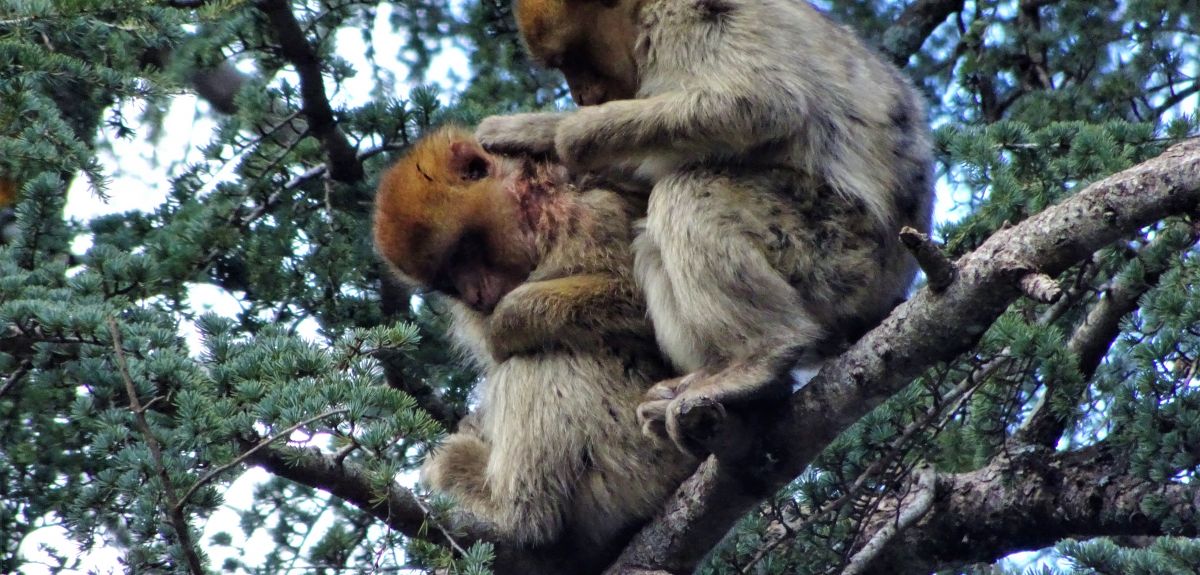
Image credit: ifaw
Unprecedented display of concern towards injured monkey offers hope for endangered species
A wild group of endangered Barbary macaques have been observed, for the first time, “consoling” and adopting an injured juvenile from a neighbouring group. The observations by a scientist from Oxford University and the International Fund for Animal Welfare (ifaw) are published today in the journal Primates.
‘Pipo’, a nearly three-year-old juvenile, was seriously injured and became separated from his group following a road traffic accident.
He was found distressed and alone two days later by a neighbouring Barbary macaque group. Although these monkeys had no social relationship with Pipo, they approached, groomed and affiliated with him, and accepted him into their group. Pipo made a full recovery and stayed with them for four months until returning to his own group.
The observation in Ifrane National Park in the Middle Atlas Mountains of Morocco – one of the Barbary macaque’s last remaining areas of habitation – provides valuable information and offers hope to researchers and local communities who are trying to safeguard and boost the endangered species, which is under threat following habitat loss and poaching.
The cute-looking baby monkeys are illegally taken from the wild when very young to be used as pets or street entertainment, but are often abandoned within a few years once their cute currency has diminished.
Returning macaques rescued from illegal trade to the wild through rehabilitation and release programmes has multiple benefits of freeing space in sanctuaries to allow continued confiscations from illegal trade, improving individual welfare, minimising captive care costs, and reinforcing wild populations.
The scientist, Liz Campbell, from the Wildlife Conservation Research Unit (WildCRU) in Oxford University’s Department of Zoology, said: ‘We thought fostering may only be an option for very young monkeys, but Pipo’s case shows even older juveniles can be accepted by wild foster groups. This observation provides valuable information for rehabilitation and release strategies, which will help improve welfare of rescued macaques, strengthen wild populations, and free space in sanctuaries to allow continued confiscations to fight illegal trade.’
Barbary macaques are known for their willingness to provide care to non-direct descendants (known as allo-parental care). As such, in addition to group releases, release into wild foster groups could be a promising strategy for supporting this threatened species. The observed spontaneous fostering of Pipo at nearly three years old offers hope that even older confiscated juveniles could be candidates for fostering, if they meet critical requirements of suitability.
The response by the neighbouring group to approach and groom the injured and distressed juvenile is unusual, since wild Barbary macaques are not usually friendly towards monkeys from other groups. There is growing evidence from several species of empathy-like behaviours, such as “consolation” (providing friendly or comforting behaviour to alleviate another’s distress), but this case is unusual by being directed towards an unknown individual. This suggests wild monkeys can exhibit what may be basic forms of empathy towards even unfamiliar individuals, providing a rare example of potential consolation of an unknown individual, and attesting to the social character of this species.
Barbary macaques are unusual among primates in that the males of the species adore babies, regardless of them being theirs or not. They will often form baby “sandwiches” with other males, which helps them bond with the babies and with other males. Barbary macaques form huddle groups with monkeys they are socially bonded with to protect against the sometimes harsh environments in the snowy Atlas Mountains.
Liz Campbell, from Oxford University’s Department of Zoology, said: ‘Barbary macaques are very social, so to return them to the wild they must be with a group, not as lone individuals. The conventional method for returning primates to the wild is rehabilitation and release of groups formed in captivity, but because of the attention and care that Barbary macaques, especially males, give to young, there is the possibility not only to release rehabilitated groups but also to release individual young into foster groups in the wild.’
There are currently just 8,000-10,000 Barbary macaques left in the world – in 1975 there were as many as 21,500. This research was part of “Born to be Wild,” a project initiated by AAP Animal Advocacy and Protection, executed together with the International Fund for Animal Welfare, and funded by the Dutch Postcode Lottery to protect Barbary macaques in Morocco.
 Professor Sue Iversen (1940–2025)
Professor Sue Iversen (1940–2025)
 New study shows how AI can help prepare the world for the next pandemic
New study shows how AI can help prepare the world for the next pandemic
 Lifestyle and environmental factors affect health and ageing more than our genes
Lifestyle and environmental factors affect health and ageing more than our genes
 Lord Hague officially admitted as Oxford University’s Chancellor
Lord Hague officially admitted as Oxford University’s Chancellor
 Lord Hague's Chancellor admission speech
Lord Hague's Chancellor admission speech